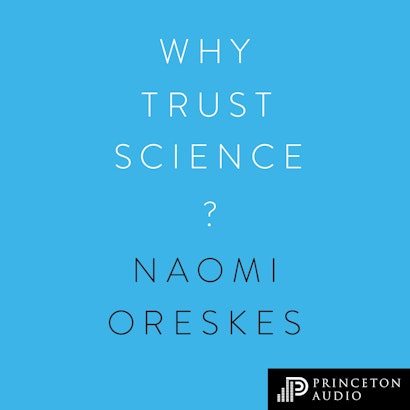Do doctors really know what they are talking about when they tell us vaccines are safe? Should we take climate experts at their word when they warn us about the perils of global warming? Why should we trust science when our own politicians don’t? In this landmark book, Naomi Oreskes offers a bold and compelling defense of science, revealing why the social character of scientific knowledge is its greatest strength—and the greatest reason we can trust it.
Tracing the history and philosophy of science from the late nineteenth century to today, Oreskes explains that, contrary to popular belief, there is no single scientific method. Rather, the trustworthiness of scientific claims derives from the social process by which they are rigorously vetted. This process is not perfect—nothing ever is when humans are involved—but she draws vital lessons from cases where scientists got it wrong. Oreskes shows how consensus is a crucial indicator of when a scientific matter has been settled, and when the knowledge produced is likely to be trustworthy.
Based on the Tanner Lectures on Human Values at Princeton University, this timely and provocative book features critical responses by climate experts Ottmar Edenhofer and Martin Kowarsch, political scientist Jon Krosnick, philosopher of science Marc Lange, and science historian Susan Lindee, as well as a foreword by political theorist Stephen Macedo.
Awards and Recognition
- New Zealand Listener's Best Book of 2019
- One of FiveBooks' Best Climate Books of 2019
"Oreskes joins a distinguished line of thinkers who explain why we should trust the findings of the scientific community . . . [and] clearly reminds readers that science has consistently brought home the bacon."—Kirkus Reviews
"Why Trust Science? is an optimistic analysis of the opportunities that exist for enhancing public trust in science. This book should be mandatory reading for anyone who is part of the scientific endeavor."—Elisabeth Gilmore, Science
"[A] fascinating new book . . . in a field with few reasons to be cheerful, it is both enlightening and encouraging. Once we begin to understand the size of the chasm that separates science’s outsiders and insiders, as Oreskes clearly does, we can at least start to design a bridge."—Michael Brooks, New Scientist
"Two features of science, [Oreskes] claims, account for its trustworthiness: its ‘sustained engagement with the world’ together with ‘its social character.’ Her emphasis on the second feature may surprise readers used to thinking of science as a tidy epistemic enterprise neatly insulated from social influence, but this view emerges clearly from her sober review of studies of science by historians, philosophers, sociologists, and anthropologists during the past half century."—Philip Kitcher, Boston Review
"A compelling argument in favour of experts."—Hettie O’Brien, New Statesman
"For both its evidence-based rigor and striking honesty, Why Trust Science? by Naomi Oreskes should be required reading for everyone in scholarly communications. Addressing the broadest view of science possible — from the experimental to the historical — this book offers crisp, accessible writing and draws important connections to our world of research dissemination and publishing."—Lettie Conrad, The Scholarly Kitchen
"Naomi Oreskes challenges easy answers."—New Scientist
"A marvellous, up to date, thorough historical survey of science and its processes."—John R. Helliwell, Journal of Applied Crystallography
"The decline of trust in science is one aspect of a much wider social issue, and the author gives a detailed survey of various perspectives from history and philosophy of science including many of the best-known names in the field."—David Lorimer, Paradigm Explorer
"Oreskes' definition of science provides us with the best knowledge we can philosophically hope to get."—Ed Gibney, The Philosopher
"How do we get to the truth? How do we safeguard scientific knowledge (and ourselves) from those whose interests are threatened by it? With her trailblazing work on climate denial and much else, Naomi Oreskes offers essential perspective on these questions. She tackles them head-on in this clear, utterly compelling book."—Naomi Klein, author of No Is Not Enough and This Changes Everything
"This comprehensive and thoughtful book explores the thorny questions we often take for granted regarding why, when, and how we can—or can't—trust science. In a post-truth world, this is the book we need."—Katharine Hayhoe, Texas Tech University, coauthor of A Climate for Change
"Naomi Oreskes's Why Trust Science? should be read by progressives, conservatives, and everyone in between. It's an important, timely, and utterly compelling book."—Elizabeth Kolbert, author of The Sixth Extinction: An Unnatural History
"In an age of fake news, alternative facts, and the notion that opinion and ideology trump empirical evidence and the scientific method, how should science respond? The title of this incredibly important book poses one of the most urgent questions of our time, because if we don't trust science then humanity is doomed."—Jim Al-Khalili, FRS, physicist, author, and host of BBC's The Life Scientific
"Anybody who wants to understand the conceptual and practical underpinnings of credibility in scientific findings should read this book."—John P. Holdren, Harvard University, former science and technology adviser to President Barack Obama
"This is a troubled time in the history of science and a perilous one for its reputation with the public, which is why now is exactly the right time for the fearless and brilliant Naomi Oreskes to explore this issue. The result is a don't-miss investigation into the very human nature of research—its successes, its failures, and its fundamental integrity in the search for truth."—Deborah Blum, Pulitzer Prize–winning author of The Poison Squad
"Why Trust Science? is a timely book by one of the world's most important and trenchant observers of science and society. With misinformation and disinformation rampant today, caring citizens do not know what or whom to trust and have become confused about evidence, opinion, and partisan assertion. We need Oreskes's clear look at how to recognize and use reliable knowledge. I cannot overstate the importance of this book now to scientists and citizens."—Rush D. Holt, CEO of the American Association for the Advancement of Science, former US House member
"Naomi Oreskes, who grabbed our attention with her keen insights into climate denial, now tackles a threat to the very basis of an informed democracy—attacks on science itself. Captivating, forceful, and grounded in critical analysis, Why Trust Science? is for anyone who cares about our world."—Jane Lubchenco, former head of the National Oceanic and Atmospheric Administration
"In this authoritative defense of science, noted scientist and science historian Naomi Oreskes presents her case, subjects it to scrutiny by experts, and responds to the points raised. Her approach itself is a metaphor for the self-correcting machinery of science and the iterative process that leads science toward a better understanding of the natural world."—Michael E. Mann, Penn State University, author of The Hockey Stick and the Climate Wars
"This book poses an important and timely question. While acknowledging the ways that science can go off track and become unreliable, Oreskes provides a compelling and well-supported defense of science, arguing that its trustworthiness derives from its collective character rather than a particular method or the inherent objectivity of scientists."—Angela N. H. Creager, author of Life Atomic: A History of Radioisotopes in Science and Medicine
"An insightful, lucid, and accessible discussion of a highly complex issue of great urgency and importance. Oreskes's call for a socially engaged science might lead to substantial changes in our conception of the role of science in society and the ways in which science is organized institutionally."—Karim Bschir, ETH Zürich

